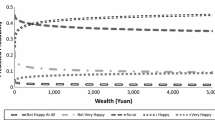Abstract
This paper uses a household surveyfrom South Africa to estimate a model ofsubjective well-being based upon poverty andhousehold characteristics including housing,sanitation, and transportation. Following Sen,we allow for factors in addition to income andwe begin to incorporate functionings andcapabilities as determinants of well-being. This study finds that important differencesexist among groups based upon their economicstatus. For the poorest quartilestransportation and housing play the mostimportant role in determining well-being, whilefor the richest quartiles, sanitation, water,energy, education and health are relativelymore important. These results have importantpublic policy implications because many of thefactors affecting well-being have large publicgood components. In addition, these resultscould be used to help governments focus aid inorder to improve well-being.
Similar content being viewed by others
REFERENCES
Allardt, E.: 1981, 'Experiences from the comparative Scandinavian welfare study, with a bibliography of the project', European Journal of Political Research 9, pp. 101-111.
Amemiya, T.: 1981, 'Qualitative response models: A survey', Journal of Economic Literature 19, pp. 1483-1536.
Amemiya, T.: 1985, Advanced Econometrics (Basil Blackwell, Oxford).
Erikson, R. and H. Uusitalo: 1987, 'The Scandinavian approach to welfare research', in R. Erikson, E. Hansen, S. Ringen and H. Uusitalo (eds.), The Scandinavian Model, Welfare States, and Welfare Research (ME Sharpe: New York).
Greene, W. H.: 2000, Econometric Analysis (Prentice Hall, Upper Saddle River, NJ).
Klasen, S.: 1997, 'Poverty, inequality and deprivation in South Africa: An analysis of the 1993 SALDRU survey', Social Indicators Research 41, pp. 51-94.
Klasen, S.: 2000, 'Measuring poverty and deprivation in South Africa', Review of Income and Wealth 46(1), pp. 33-58.
May, J., M. Carter and D. Posel: 1995, 'The composition and persistence of rural poverty in South Africa', Land and Agriculture Policy Centre Working Paper 15 (LAPC, Johannesburg).
Møller, V. and W. Saris: 2001, 'The relationship between subjective well-being and domain satisfactions in South Africa,’ Social Indicators Research 55, pp. 97-114.
Sen, A.: 1988, 'The concept of development', in H. Chenery and T. N. Srinivasan (eds.), Handbook of Development Economics, Volume I (Elsevier Science Publisher).
Sen, A.: 1992, Inequality Examined (Harvard University Press, Cambridge, MA).
Sen, A.: 2000, Development as Freedom (Anchor Books: New York).
Srinivasan, T. N.: 1994, 'Human development: A new paradigm or reinvention of the wheel', American Economic Review 84(3), pp. 238-243.
Sugden, R.: 1993, 'Welfare, resources and capabilities: A review of inequality reexamined by Amartya Sen', Journal of Economic Literature 31(4), pp. 1947-1962.
Author information
Authors and Affiliations
Rights and permissions
About this article
Cite this article
Bookwalter, J.T., Dalenberg, D. Subjective Well-Being and Household Factors in South Africa. Social Indicators Research 65, 333–353 (2004). https://doi.org/10.1023/B:SOCI.0000003546.96008.58
Issue Date:
DOI: https://doi.org/10.1023/B:SOCI.0000003546.96008.58




